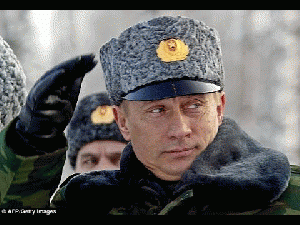Cross-posted from Smirking Chimp
"Comrade Wolf knows who to eat, and he eats without listening to anyone." ~~ Russian President Vladimir Putin, referring to the United States
The Ukraine crisis has its roots in a policy that dates back nearly 20 years. The origins of the policy can be traced to a 1997 article in Foreign Policy magazine by Zbigniew Brzezinski, titled "A Geostrategy for Eurasia." The article makes the case that the United States needs to forcefully establish itself in Central Asia in order to maintain its position as the world's only superpower.
While many readers may be familiar with Brzezinski's thinking on these matters, they might not know what he has to say about Russia, which is particularly illuminating given that the recent uptick in violence has less to do with Ukraine than it does with Washington's proxy-war on Russia. Here's what Brzezinski says:
"Russia's longer-term role in Eurasia will depend largely on its self-definition...Russia's first priority should be to modernize itself rather than to engage in a futile effort to regain its status as a global power. Given the country's size and diversity, a decentralized political system and free-market economics would be most likely to unleash the creative potential of the Russian people and Russia's vast natural resources. A loosely confederated Russia -- composed of a European Russia, a Siberian Republic, and a Far Eastern Republic -- would also find it easier to cultivate closer economic relations with its neighbors. Each of the confederated entitles would be able to tap its local creative potential, stifled for centuries by Moscow's heavy bureaucratic hand. In turn, a decentralized Russia would be less susceptible to imperial mobilization." (Zbigniew Brzezinski, A Geostrategy for Eurasia, Foreign Affairs, 76:5, September/October 1997.)
So is this the goal of US policy, to create "A loosely confederated Russia" whose economy can be subsumed into America's market-based system?
Notice how easily Brzezinski chops Russia into smaller, bite-size statelets that pose no threat to US imperial expansion. Brzezinski undoubtedly envisions a Russia that will sell its vast resources in petrodollars and recycle them into US Treasuries further enriching the corrupt rent-skimmers in Washington and Wall Street. He foresees a Russia that will abdicate its historic role in the world and have no say-so in shaping global policy. He imagines a compliant Russia that will help facilitate US imperial ambitions in Asia, even to the point where it will pay to police its own people on behalf of US oligarchs, weapons manufacturers, oil magnates, and 1 percenters. Here's the paragraph in Brzezinski's piece that sums up Washington's objectives in Ukraine, Russia and beyond. It is fittingly headlined with the following words in bold print:
"TRANSCONTINENTAL SECURITY
"Defining the substance and institutionalizing the form of a trans-Eurasian security system could become the major architectural initiative of the next century. The core of the new transcontinental security framework could be a standing committee composed of the major Eurasian powers, with America, Europe, China, Japan, a confederated Russia, and India collectively addressing critical issues for Eurasia's stability. The emergence of such a transcontinental system could gradually relieve America of some of its burdens, while perpetuating beyond a generation its decisive role as Eurasia's arbitrator. Geostrategic success in that venture would be a fitting legacy to America's role as the first and only global superpower." (Zbigniew Brzezinski, "A Geostrategy for Eurasia," Foreign Affairs)
Translation: The United States will police the world, dispatch troublemakers, and eliminate potential threats wherever it finds them. It will impose its neoliberal dogma (Austerity, privatization, structural adjustment, anti labor reforms, etc.) across-the-board and on all participants. Also, minor partners -- "Europe, China, Japan, a confederated Russia, and India" -- will be expected to provide security for their own people at their own expense in order to "relieve America of some of its burdens."
Nice, eh? So you even have to pay for your own jailers.
And what is "Transcontinental Security" anyway? Isn't it just a fancy way of saying "one world government"?
Indeed, it is. It's the very same thing. Here's more from Brzezinski:
"Failure to widen NATO...would shatter the concept of an expanding Europe... Worse, it could reignite dormant Russian political aspirations in Central Europe."
This is an oddly convoluted statement. In the first sentence, Brzezinski supports the idea of an "expanding Europe," and then in the next breath, he worries that Russia might want to do the same thing. It's another case of the pot calling the kettle black.
What's clear, is that -- in Brzezinski's mind -- EU and NATO expansion will help Washington achieve its hegemonic aspirations. That's all that matters. Here's what he says:
(Note: You can view every article as one long page if you sign up as an Advocate Member, or higher).






